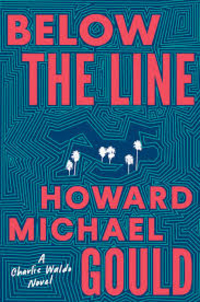Destroying Angel by Richard Paul Russo
 Friday, November 29, 2019 at 8:09AM
Friday, November 29, 2019 at 8:09AM 
First published in 1992; published by Dover Publications on April 17, 2019
Destroying Angel is a better-than-average example of science fiction noir. The story is set in the near future. Society has taken a dystopian turn that provides the background for a crime story involving a gruesome serial killer. The novel tells a self-contained story, but it is also the first book in a trilogy.
Louis Tanner is a former cop. He became a cop to help people with drug problems because his girlfriend, Carla, died from an overdose, a death that still obsesses him. Tanner quit his job after he and his partner were shot. His partner died, leaving Tanner with the brooding sense of guilt that is common among ex-cops who star in crime thrillers.
As Tanner watches the bodies of a man and woman, chained together, being pulled from the water, he remembers when he pulled two chained bodies out of the water. There have been more than three dozen victims of the Chain Killer, but none in the last two-and-a-half years. The chains are fused to the bones of the victims and angel wings are tattooed inside their nostrils.
Tanner engages with Homicide Detective Frank Carlucci, who is supervising the extraction of the bodies. Notwithstanding his retirement, Tanner wants to know whether and why the chain killer has returned. Tanner and Carlucci work together to track down the killer.
Tanner lives in San Francisco, outside of the walled-off Financial District that houses the city’s wealthiest inhabitants. Chinatown has absorbed the former Italian enclave of North Beach. The Tenderloin is still dicey. Street soldiers keep order in the rest of the city, except for an area called the Core that is at least partially underground.
The street soldiers can’t stop a girl named Sookie from stealing motorized skateboards. But while Sookie is trying to hide in the underground tunnels, she comes across a room with chains that are very like the chains she has seen on the murder victims.
The science fiction elements give the novel an offbeat spin without overpowering what is essentially a detective story involving a serial killer story. For example, Tanner is asked to arrange a trip to the New Hong Kong satellite for a criminal who wants to regenerate his damaged body. There’s also a cyborg angle to the story that readers won’t encounter in a typical crime novel.
While Tanner is a typically tortured noir character, he is a sympathetic protagonist who has enough depth to carry the novel. Carlucci and Sookie are developed in less detail, but they probably have all the characterization they need. The Chain Killer is suitably creepy and his motivation to be evil is credible, at least in the context of a science fiction novel.
The story is gritty. It moves at a steady pace, not so fast that the dark atmosphere is lost but not so slowly that tension dissipates. The ending is true to the novel’s noir nature. Crossovers of the science fiction and crime genres don’t always work, but this one works better than most.
RECOMMENDED


